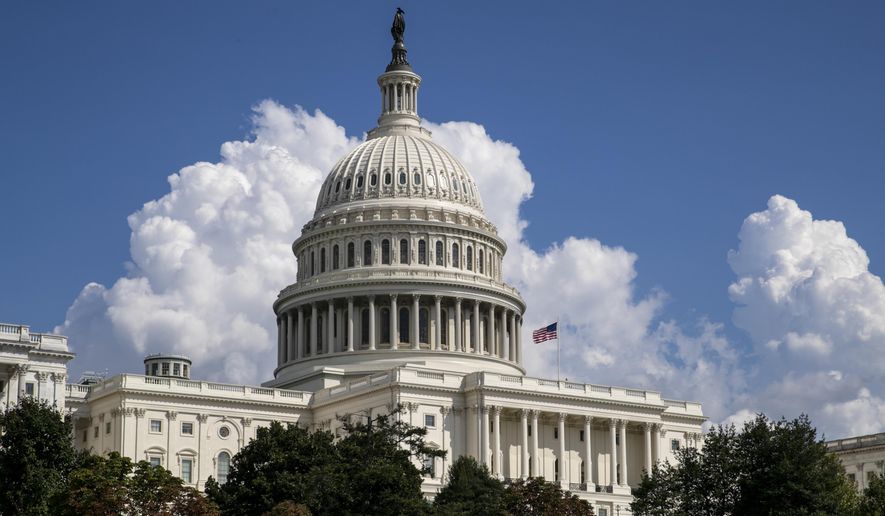Republicans took the first official step Wednesday toward a rule change that would allow the Senate to speed up votes for some of the president’s nominees, setting the stage for what is likely to become a “nuclear” confrontation.
While pleading for bipartisanship, GOP senators made clear they likely will act on a plan to cut the amount of debate time after filibusters to two hours on most presidential nominees, down from the 30 hours currently allowed under the rules.
The 10-9 party-line vote made clear that bipartisanship is unlikely, leaving Republicans with only one option if they want to force the new rules through in time for President Trump to benefit: use the “nuclear option” to approve the changes on a majority vote.
“Make no mistake. The Republicans can change this, and will,” said Sen. Lamar Alexander, Tennessee Republican.
The issue, Republicans say, is that even though Democrats can’t unilaterally stop nominees now that it takes just a majority vote to overcome a filibuster, they can insist on using the full 30 hours’ debate that is allowed even when a filibuster has been defeated.
And Democrats have done that repeatedly to Mr. Trump, delaying his ability to fill hundreds of vacancies.
SEE ALSO: Lindsey Graham open to restoring 60-vote filibuster for judicial nominees
Democrats acknowledged that the process has gone off the rails but blamed Republicans for poisoning the well when they blocked one of President Obama’s prominent picks, Judge Merrick Garland, from earning a seat on the Supreme Court.
Several Democratic senators said they would be fine with giving a future president a speedier path for nominees — but won’t do it for Mr. Trump.
“Most Americans aren’t familiar with our arcane rules, but what they are familiar with is they want more transparency. They’re concerned with what’s going on in the White House with some of these picks. It’s our job to be the counterbalance,” said Sen. Amy Klobuchar, the Minnesota Democrat who is leading the blockade of the rules change and who announced her presidential campaign Sunday.
Republicans said she was shooting herself in the foot, saying there’s no way the GOP would allow a future President Klobuchar to speed her nominees through if she won’t cooperate now.
“Our view at that point is going to be well, we should act just like you did,” said Senate Majority Leader Mitch McConnell.
The Republicans’ proposal would leave a full 30 hours of possible debate time in place for the biggest nominees, including Cabinet-level posts, circuit appeals court judges and Supreme Court justices. But for more than 1,000 other posts, the possible debate time would be cut from 30 hours to two hours.
Under the 30-hour standard, it can take a full week of Senate business to confirm five nominees.
At that rate, staffing a new administration could take 23 years, Mr. Alexander pointed out.
He brings unique credibility to the debate, having worked in 2013 on a similar deal to help speed up Mr. Obama’s nominees. He worked with then-Majority Leader Harry Reid, a Democrat, on a temporary deal that reduced debate time to two hours for non-Cabinet executive branch nominees and to eight hours for district judgeships.
“We did it immediately. I didn’t say we should wait for the next president,” Mr. Alexander said, chiding Democrats such as Ms. Klobuchar who said they would be willing to talk about changes after Mr. Trump’s term ends. “I’m waiting for my Democratic friends to show the same kind of bipartisan spirit I showed.”
Without Democratic cooperation, the nuclear option is growing increasingly likely.
That involves the chamber reinterpreting its existing rules in a new way — a process that can be done with a majority vote. Mr. Alexander said it’s like a football referee saying that while the rule book says it takes 10 yards for a first down, he’ll decide it takes only nine yards.
Democrats used the nuclear option in 2013 to cut the number of votes needed to end a filibuster on most nominees from 60 to just a majority. Some have since come to regret that move, since it has allowed Republicans to approve a number of nominees Democrats would have been able to filibuster, had the 60-vote threshold still existed.
That 2013 move left plenty of bad blood, and Democrats warned Republicans there would be “hard feelings” this time, too.
“Today’s proposal benefits only the majority, and the majority is trying to rush it through,” said Sen. Tom Udall, New Mexico Democrat.
• Stephen Dinan can be reached at sdinan@washingtontimes.com.




Please read our comment policy before commenting.